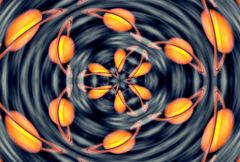S_KaleidoPolar
Warps the source clip around in a disk shape and reflects radially as if viewed through a reflecting cylinder.In the Sapphire Stylize effects submenu.
Inputs:
- Source: The current layer. The input clip to be warped.

|
S_KaleidoPolarWarps the source clip around in a disk shape and reflects radially as if viewed through a reflecting cylinder.In the Sapphire Stylize effects submenu.
Inputs:
|
|
© 2007, GenArts, Inc. All rights reserved.